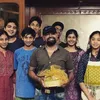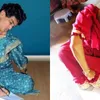How Dr Aiswarya Rao overcame disability to empower differently-abled women
After working in the public health space as part of the government’s National Anti-Retroviral Therapy Programme for many years, Aiswarya, a pediatrician and an activist, in 2016 established Better World Shelter, a rehabilitation centre for disabled women.
The human spirit is one of strength, determination, and fortitude that no disability can take away. Forty-seven-year-old Aiswarya Rao stands as an exemplar to this. A pediatrician by profession and a disability rights activist by choice, Aiswarya is a driving force for many women today.
Brought up in the musical city of Chennai, Aiswarya was diagnosed with polio at the age of three. The infectious disease led to the weakening of her muscles, which in turn resulted in locomotive disability. Since then, Aiswarya has not been able to make unrestricted use of her legs and arms. However, this did not come in the way of achieving her goals and fighting for her passion.

Aiswarya Rao, 47, has launched a rehabilitation centre for disabled women.
After working in the public health space as part of the National Anti-Retroviral Therapy Programme for over a decade, Aiswarya established Better World Shelter at Chennai in 2016, a rehabilitation centre for disabled women.
“A lot of differently-abled women are forced to deal with discrimination, violence, and stigma to create an identity for themselves. They are turned away from educational, health, and job opportunities. For instance, UNESCO and the World Blind Union estimate that the worldwide literacy rate for women with disabilities is one percent, compared to about three percent for people with disabilities as a whole. So, I decided to do my bit for them by setting up a world without barriers in the form of a shelter,” Dr Aiswarya Rao, Founder, Better World Shelter, tells SocialStory.
Aiswarya’s awe-inspiring journey
Aiswarya’s father was a senior IAS officer who occupied positions like that of the District Magistrate and the Collector when she was young.
She says she did not undergo formal education until she was nine years old.

Aiswarya Rao along with women at the Better World Centre.
“My parents were apprehensive of sending me to school initially. They wanted to safeguard me. My mother taught me to read and write. However, they enrolled me for third grade to CSI Bain School at Anna Nagar in Chennai. The principal was kind enough to take me in despite my disability. I still remember those days – studying under thatched roofs, the chitter-chatter with classmates, and rushing with homework. It was one of the best phases of my life,” Aiswarya recalls.
Subsequent to secondary school, Aiswarya got admission in nine engineering colleges and a medical university. Despite having an inclination towards fine arts, she took up MBBS at Kilpauk Medical College as her parents insisted on it. After completing the degree in 1996, Aiswarya pursued a diploma in child health from Ramachandra Medical College.

The front elevation of the Better World Shelter in Chennai.
“I struggled quite a lot to study subjects I was incurious about. At one point, it reached a stage where I couldn’t do it anymore. So, I stopped going to college until the head of the department wrote a letter after a month, encouraging me to rejoin. From there on, I began to develop an inclination towards medicine and valued it,” Aiswarya says.
After completing her higher education, in 1999, she started working with World Vision, a humanitarian organisation that specialises in areas such as emergency relief, education, and healthcare.
A few years later, Aiswarya gained expertise in treating HIV-infected people through antiretroviral therapy. She then went on to take up some integral roles in her field such as being the head of the technical team as part of the government’s free anti-retroviral programme; she was also a researcher at the Indian Council of Medical Research (ICMR).

Aiswarya with wheelchair basketball players and their many trophies.
But as things were looking bright, Aiswarya met with another unfortunate incident when she dislocated her hip after trying to walk, using poor quality calipers. She had to undergo a major surgery for the same.
“It was a really tough phase for me. I even decided to take a break from my job,” she says.
Just as she was recovering, she happened to interact with many differently-abled women. During the time, Aiswarya figured that she had been blind to their hardships all her life, though she herself was one among them. She understood the subtle discriminations, the judgmental remarks, and limitations they faced, and made up her mind to do something for them.
Transforming the lives of women
A year later, instead of going back to pediatrics, Aiswarya set up Better World Shelter, a rehabilitation centre for disabled women at Nungambakkam in Chennai. The idea was to provide a safe space for young women with intellectual or physical disabilities to flourish and succeed. Better World Shelter doubles up as a place of stay and a skill training hub.

Disabled women doing art and craft at the shelter.
“The government and the corporation have been very supportive. Apart from providing regular grants to meet operational costs, they refer destitute and disabled women. But there is a shortage of funds due to mounting maintenance costs, and I have pledged my personal savings and jewellery to meet expenses,” Aiswarya says.
As of today, the shelter houses 55 women with a range of disabilities - locomotor, speech, learning, hearing, and visual impairment, among others. Aiswarya says she makes it a point to organise a slew of vocational training sessions on a periodic basis, including jewellery making, sewing, quilting, sports, art, and embroidery.

Differently-abled women at Better World Shelter warm up to play a game of basketball.
Now, since the demand for face masks has shot up amid the coronavirus outbreak, the women are being taught to make them within the premises. In addition to this, if any of the women have a deep desire to pursue higher education, Aiswarya pools in funds to help them.
“I have been organising sessions with external trainers and experts. This boosts confidence and enables women to recognise dormant skills. Ultimately, it helps them lead an independent and dignified life. For instance, two of the women from our shelter have won national-level wheelchair basketball matches and bagged a whole lot of medals after training. Everything that I am doing feels worth it when I witness the success of these women,” Aiswarya says.
(Edited by Megha Reddy)








